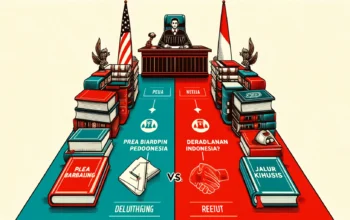Legal Literacy – This article discusses the importance of international civil law in dealing with issues involving foreign elements. The discussion includes the purpose of international civil law, qualifications in international civil law, and theories of international civil law qualifications that are important to understand.
The article also discusses the advantages and disadvantages of Lex Fori’s qualification theory as well as the exceptions that exist. By reading this article, readers can understand the importance of international civil law in addressing legal issues involving foreign elements and make the right decisions in the qualification process.
Based on the provisions of Article 16 Algemene Bepalingen (AB) states regarding the status and legal authority for Indonesian citizens, Indonesian law applies wherever it is located. This provision is interpreted analogously by foreign nationals in Indonesia. However, with the abolition of the classification of the population in Indonesia, the distinction of the population based on its nationality resulted in legal relations that were originally inter-group legal relations in Indonesia turning into legal relations of an international nature due to the presence of foreign elements.
Objectives of International Civil Law
According to Sunaryati Hartono, international civil law aims to find answers to three main problems concerning legal events with foreign elements, namely: (1) which judge or court is authorized, (2) which law applies(choice of law), and (3) when and to what extent national judges must pay attention to foreign court decisions.
This shows that the existence of the law is increasingly important and absolutely necessary. For example, the existence of international civil law issues such as marriage and divorce, international buying and selling, dual nationality issues, international adoption also allows for legal relationships that have a foreign element. It can be said that international civil law is basically national civil law for international matters.
Qualifications in International Civil Law
The issue of qualification is one that must be dealt with more specifically, because in international civil law cases one is always dealing with the possibility of more than one system or rule of law from several different countries applying.
It is through this qualification process that people will collect facts in the legal event and then classify them in a certain juridical category in relation to making legal decisions on legal issues.
Qualification is a logical thinking process to place the conception of certain legal principles and rules into the applicable legal system. Qualification in international civil law is important because it relates to the obligation to choose one of the legal systems relevant to the case at hand.
An important issue that arises in the process of qualifying international civil law is basically based on what legal system the qualification in an international civil law case should be carried out. In order to answer this question, various theories of international civil law qualifications have emerged, namely as follows:
1. Lex Fori Qualification Theory (According to Judges)
Bartin from France and Franz Khan from Germany are the leading proponents of this theory. The material law of the Judge is to be used in this qualification. For example, when faced with the terms “marital agreement”, “domicile” and “tort”, these terms are defined and interpreted based on the material law of the Judge himself.
Therefore, the advantage of this qualification theory is that it facilitates the resolution of a case because the law used is the material law understood by the judge. On the other hand, the weakness of this theory is the injustice that may occur due to the existence of measures that may not be in accordance with the foreign law that should be applied or even measures that are completely unknown in the foreign law.
The legal notions in the rules of international civil law must be qualified in accordance with the internal-material legal notions of the Judge’s own law. There are some exceptions to the lex fori qualification, namely:
- Nationality qualification;
- Qualification of movable and immovable objects;
- Qualifications for which there is a choice of law;
- Qualification under international conventions, if the country concerned is a party to the convention;
- Qualification of unlawful acts; and
- Definitions used by international tribunals.
2. Lex Causae Qualification Theory (Extended Lex Fori)
This theory was pioneered by Martin Wolff. Qualification should be done according to the legal system from which the notion originated. The act of qualification is intended to determine which rules of international civil law from the lex fori are most closely related to the rules of foreign law that may apply.
This determination must be made on the basis of the results of the qualification carried out with due regard to the foreign legal system concerned. Once the jurisdictional category of a legal event has been established in this way, it can then be determined which rules of international civil law from the lex fori will be used to point towards the lex causae or closely related foreign law that should apply to resolve the case.
Qualifications should be applied in accordance with the size of the overall legal system relating to the case. The purpose of this theory is to determine which rules of international civil law from the lex fori are most closely related to the rules of foreign law that may apply. The presumption of this theory is that qualification should be carried out in accordance with the overall system and measure of the law to which the case relates.
3. Autonomous Qualification Theory
This qualification is based on comparative law. The luminaries of this theory are Ernst Rabel from Germany and Beckett from England. This theory basically stems from their rejection of the assumption that the rules of international civil law only cover the internal law of the forum.
In this act of qualification, the collection of facts must be carried out independently of its relation to a particular national legal system (autonomous). This means that international civil law should develop legal concepts that are unique, generally applicable and have the same meaning wherever they are. Provisions are tailored to the distinctive notions of international civil law, so they do not need to be identical to the notions in judicial or foreign law.
4. Phased Qualification Theory
This theory stems from objections to the theory of qualification based on the lex causae alone, because what legal system or which law is to be determined as the lex causae still has to be determined first. This can only be done through the qualification process and link point assistance. The objections to the Lex Causae theory led to the emergence of the gradual qualification theory.
Qualification according to Phased Qualification Theory is done through two stages, namely:
- First Stage Qualification or Primary Qualification, i.e. the Judge must find the rules of international civil law or choice of law (lex fori) that will be used to determine the determining link point. Qualification is carried out using the internal qualification system known as lex fori, where qualification is carried out in order to establish the lex causae.
- Second Stage Qualification or Secondary Qualification, i.e. if it is known that the law that should apply is a foreign law, then further qualification needs to be done according to the foreign law that has been found. In this second stage, all the facts in the case must be re-qualified based on the qualification system that exists in the lex causae, and then run with the internal qualification system known in the lex causae.
Reference
- Gautama, Sudargo. Pengantar Hukum Perdata Internasional Indonesia. Jakarta: Bina Cipta, 2016.
- Hartono, Sunaryati. Pokok-Pokok Hukum Perdata Internasional. Bandung: Binacipta, 1976.
- Purwadi, Ari. Dasar-Dasar Hukum Perdata Internasional. Pusat Pengkajian Hukum dan Pembangunan Fakultas Hukum Universitas Wijaya Kusuma Surabaya, 2016.
- Seto Hardjowahono, Bayu. Dasar-Dasar Hukum Perdata Internasional. Bandung: PT Citra Aditya Bakti, 2013.
*This article is the personal opinion of the author and does not represent the views of the editorial staff of Literasi Hukum Indonesia.








